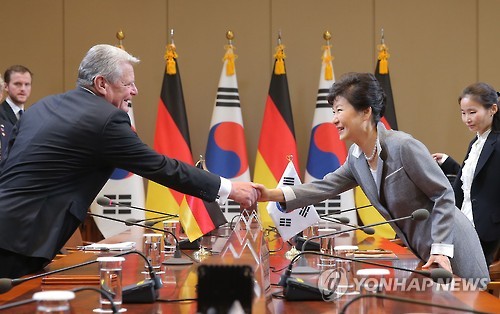ID :
383394
Tue, 10/13/2015 - 05:24
Auther :
Shortlink :
https://oananews.org//node/383394
The shortlink copeid
S. Korea, Germany vow to make efforts for N. Korea's denuclearization

SEOUL, Oct. 12 (Yonhap) -- President Park Geun-hye said Monday that she agreed with German President Joachim Gauck to make efforts to ensure North Korea will abandon its nuclear weapons program and join the international community.
Park said in a joint news conference with Gauck after the summit that they shared "the urgency and importance of North Korea's denuclearization."
North Korea pledged to scrap its nuclear programs in return for diplomatic concessions and economic aid under a landmark 2005 nuclear deal with South Korea, the U.S., China, Russia and Japan.
The North later backtracked from its commitment and conducted nuclear tests in 2006, 2009 and 2013, drawing international condemnation and U.N. sanctions.
The North has repeatedly vowed to develop its economy and nuclear arsenal in tandem, viewing its nuclear programs as a powerful deterrent against what it claims is Washington's hostile policy against it.
Park also said she and Gauck will continue to cooperate to help improve North Korea's dismal human rights record, though she did not elaborate.
North Korea has long been accused of grave human rights abuses, ranging from holding political prisoners in concentration camps to committing torture and carrying out public executions.
The North has denied accusations of its alleged rights abuses, describing them as a U.S.-led attempt to topple its regime. The country has claimed it has the world's most advantageous human rights conditions and policies.
Park also said South Korea will further strengthen cooperation with Germany over potential unification between South and North Korea, noting the German experience of unification can be a valuable lesson to South Korea.
Park believes that peaceful unification is the fundamental solution to resolve the standoff over North Korea's nuclear weapons program. She has called unification a "bonanza" for South Korea as well as a blessing for neighboring countries.
Gauck said he is pleased that South Korea and Germany exchange opinions on the issue of unification.
North Korea has long suspected that Seoul could be plotting to absorb Pyongyang, a claim denied by South Korea.
The Korean Peninsula was divided into the capitalistic South and communist North after liberation from Japan's 1910-45 colonial rule. The two sides then fought in the 1950-53 Korean War, which ended in a truce, not a peace treaty.
Also Monday, state-run Korea Electronics Technology Institute and BMW, a German luxury car brand, signed a memorandum of understanding calling for cooperation in automobile and information and technology.
Trade volume between South Korea and Germany stood at US$28.9 billion in 2014, up 36 percent from 2009.
entropy@yna.co.kr
(END)





